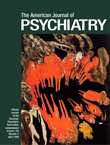Health Care Utilization by Older Patients With Coexisting Dementia and Depression
Abstract
OBJECTIVE: Few studies have examined the course of coexisting dementia and depression. The purpose of this study was to compare elderly patients who had coexisting dementia and depression with elderly patients who had either disorder alone in terms of their utilization of inpatient and outpatient services. METHOD: The study group included 7,115 veterans aged 60 years or older who had been discharged from Department of Veterans Affairs inpatient units in 1992 with diagnoses of major depression, dementia, or both. Outcome measures were analyzed for a 2-year period following the index hospitalization for each diagnostic study group. RESULTS: Patients with coexisting dementia and depression had significantly more psychiatric inpatient days than the other two study groups and more medical inpatient days and nursing home readmissions than patients with depression alone. Patients with coexisting dementia and depression had significantly more total inpatient days than the other two groups. Notably, patients with coexisting dementia and depression did not utilize more outpatient resources than the other study groups; in fact, they had significantly fewer medical, psychiatric, and total visits than patients with depression alone. CONCLUSIONS: The findings suggest that patients with coexisting dementia and depression are high utilizers of inpatient services, with a course of illness that may resemble dementia in terms of nursing home and inpatient medical care utilization and depression in terms of inpatient psychiatric care utilization; however, these patients utilized significantly fewer outpatient resources than the group with depression alone. Aggressive outpatient treatment approaches might reduce utilization of inpatient care for patients with coexisting depression and dementia.



